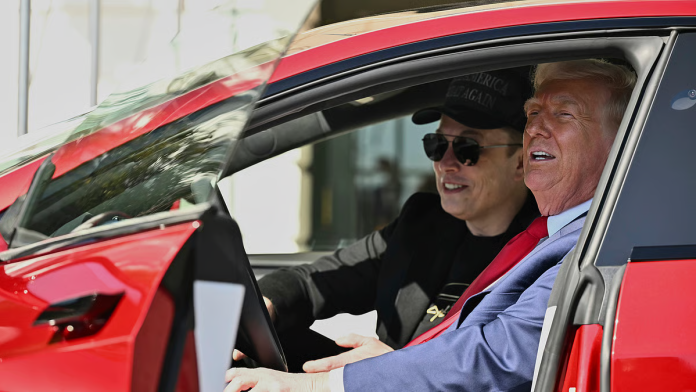Tesla suffered an unprecedented collapse in customer loyalty following CEO Elon Musk’s endorsement of US President Donald Trump and subsequent political activities, Reuters reports, citing exclusive data from S&P Global Mobility.
The electric vehicle pioneer, which consistently led the automotive industry with a 73% loyalty rate in June 2024, saw this metric nosedive to 49.9% by March 2025. While May 2025 showed a partial recovery to 57.4%, this remains substantially below Tesla’s historical dominance and trails competitors like Chevrolet and Ford.
The loyalty collapse correlates precisely with Musk’s July 2024 endorsement of Trump after an assassination attempt on the Republican nominee. This alignment alienated Tesla’s traditionally eco-conscious, liberal-leaning customer base.
The backlash intensified when Musk launched Trump’s Department of Government Efficiency (DOGE) in January 2025, overseeing widespread federal job cuts. Global protests followed, including vandalism at Tesla dealerships and Cybertrucks daubed with swastikas incidents Trump condemned as “domestic terrorism.”
The data reveals a stark shift in customer migration: after four years of gaining nearly five households for every one lost, Tesla now gains fewer than two for each defection. Brands like Rivian, Polestar, Porsche, and Cadillac now net more former Tesla owners than they lose to the EV maker.
Operational challenges compound reputational damage
Tesla’s struggles extend beyond politics. The company faces a perfect storm of regulatory scrutiny, product stagnation, and safety concerns. Tesla’s sole new model since 2020, the angular Cybertruck, underperformed despite Musk’s predictions of “hundreds of thousands of annual sales.” Meanwhile, competitors like BYD surged ahead with technological innovations, including ultra-fast charging systems.
Tesla’s attempt to trademark “Robotaxi” was rejected by the US Patent and Trademark Office (USTPO) for being “too generic,” while “Cybercab” faced similar obstacles due to competing trademarks.
The company’s limited Austin Robotaxi launch in June 2025, with safety monitors in passenger seats, drew NHTSA scrutiny after videos showed vehicles braking erratically and driving in opposing lanes.
Despite Musk’s claims of rapid expansion, California regulators issued explicit warnings against unauthorised Robotaxi operations.
Moreover, a Florida jury ordered Tesla to pay $324 million in damages after partially blaming its driver-assistance technology for a fatal 2019 crash. Concurrently, CFO Vaibhav Taneja cited “several weeks of lost production” during Model Y retooling, alongside vandalism-related disruptions.
Globally, Tesla sales fell 8% in the US and 33% in Europe during early 2025. European markets proved particularly hostile, with Germany witnessing EV registrations plummet 45% year-on-year in January. CFRA Research’s Garrett Nelson noted Musk’s political activism arrived at the “very bad timing,” coinciding with intensified competition and economic headwinds.
Despite these challenges, Tesla granted Musk 96 million shares (worth $29 billion) to retain his leadership. Some investors, like Zacks Investment Management’s Brian Mulberry, remain optimistic about Tesla’s pivot to robotaxis and AI, arguing future profits could render consumer vehicle sales secondary.
